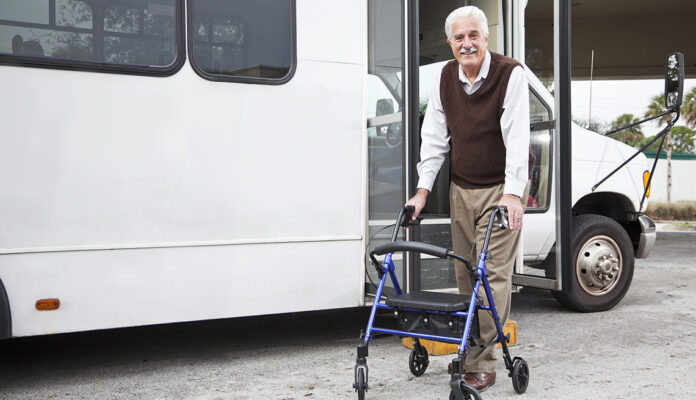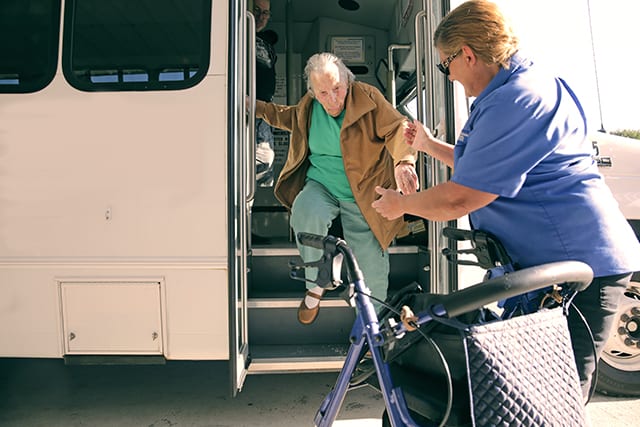
For our aging loved ones, medical appointments aren’t just routine visits, they’re vital for maintaining good health and well-being. But one significant challenge that the elderly face is securing reliable transportation to these appointments. From navigating public transport to relying on busy family members or caregivers, the issue is multi-faceted and calls for immediate attention. This blog post aims to delve into the complexities of these challenges, provide insights into existing solutions, and point towards newer, innovative approaches that could enhance accessibility for our elders.
Lack of Accessible Transportation Options

Despite the crucial role public transportation plays in our society, there are still areas where its availability is limited, and its accessibility for elderly patients falls short. Buses and trains may not be wheelchair accessible or have priority seating for those with mobility impairments. Furthermore, many public transport systems aren’t user-friendly for those with visual or hearing impairments, increasing the risk of accidents or missed stops. What’s needed are specialized transportation services tailored to the requirements of elderly patients, ensuring not only accessibility but also safety and comfort during their medical visits.
Dependence on Family and Caregivers
Family members and caregivers often bear the responsibility of arranging transport for elderly to hospital. However, balancing their own professional and personal commitments alongside this responsibility can be taxing. This predicament places a strain on both the patient and the caregiver, leading to potentially missed appointments and ensuing health complications. It’s clear then, that providing alternative transport options for elderly patients is not just a matter of convenience but an essential aspect of their healthcare.
Non-Emergency Medical Transportation (NEMT) Services

Enter Non-Emergency Medical Transportation (NEMT) services, designed specifically to bridge the gap between elderly patients and their medical appointments. These services offer transportation that is customized to the specific needs of the elderly, considering factors like mobility issues, cognitive impairments, and chronic health conditions. NEMT services provide the reliability and convenience that public transportation and personal caregiver transportation may lack, making them a beneficial option for elderly patients.
Door-to-Door Services
For many elderly patients, simply getting out the front door is a challenge. Door-to-door transportation services ease this burden by offering pick-up and drop-off right at the patient’s home. These services enhance accessibility, alleviate stress associated with travel, and ensure that patients arrive at their appointments on time. More than just a transport service, they offer peace of mind to patients and their families.
Accommodating Medical Equipment and Mobility Aids

Transporting medical equipment or mobility aids like wheelchairs and walkers presents another challenge for elderly patients. Not all vehicles are equipped to handle these items, making it even more difficult for patients to reach their medical appointments. Transportation services that can accommodate these needs offer a much-needed solution. These specialized services not only have vehicles with sufficient space but also trained personnel who can help with loading and unloading the equipment.
Safety and Comfort
Safety and comfort are absolutely paramount when transporting elderly patients. The vehicles used for this purpose must be well-maintained and equipped with essential safety features, such as seat belts, safety rails, and proper wheelchair securements, to protect against potential mishaps. Furthermore, the drivers need to be trained not just in operating the vehicle but also in patient handling techniques and emergency procedures, ensuring that all possible scenarios are accounted for.
Reliable transportation services prioritize patient safety above everything else, offering peace of mind to both the patients and their families. Additionally, comfortable travel is equally important. Features like adjustable seating, appropriate space, and climate control ensure that the journey is as comfortable as possible, reducing stress for patients who may already be feeling anxious about their medical visits. The goal is to make the journey to healthcare facilities less about the travel and more about focusing on their health.
Affordable Transportation Options

Elderly patients often live on a fixed income, and financial constraints can prevent them from accessing reliable transportation. However, there are affordable options available that take these constraints into account. Initiatives such as subsidized programs by government bodies or community initiatives that provide free or discounted services are stepping stones towards accessible transportation.
These programs are often designed keeping the elderly population in mind, understanding that affordable transportation is not a luxury; it’s a necessity, a basic right. When these services are within financial reach, it significantly enhances access for elderly patients, ensuring they can attend their medical appointments without worrying about how they will manage the expense. The alleviation of this financial stress makes a considerable difference to their overall healthcare experience.
Communication and Assistance
Effective communication and assistance are crucial for smooth medical visits. Reliable transportation services ensure that there are trained personnel onboard to assist elderly patients, from helping them board and exit the vehicle to answering any queries they may have. These personnel are also trained to facilitate clear communication between the transportation providers, healthcare facilities, and the patients, thereby ensuring a seamless journey.
Any information related to pick-up and drop-off times, changes in schedule, or any specific needs of the patient are communicated promptly and efficiently. This smooth coordination goes a long way in ensuring that medical visits are not a source of stress but a step towards better health. In this way, transportation becomes more than just about moving from one point to another; it becomes an integral part of the healthcare journey.
Transportation for Specialized Medical Needs

Elderly patients with specialized medical needs face unique transportation challenges. They require services that can accommodate specialized medical equipment or are equipped to handle specific medical conditions during transit. Whether it’s transporting a patient on dialysis, with specialized equipment, or one with a respiratory condition that requires constant monitoring, these specialized services play a vital role.
Understanding the patient’s medical needs, having properly equipped vehicles, and trained staff are crucial to ensure the patient’s medical needs are met, even while in transit. The journey becomes more than just transportation; it becomes an extension of the healthcare environment, providing care and comfort to the patient throughout the journey.
Community Partnerships and Support
Community partnerships between healthcare organizations, transportation providers, and local resources can play a significant role in addressing the transportation challenges faced by elderly patients. These collaborations leverage shared resources and expertise to improve access to reliable transportation, thereby ensuring that our elders don’t miss their medical appointments. Successful initiatives across various communities stand as a testament to the potential of such partnerships.
Conclusion
Securing reliable transport for medical visits is a critical aspect of healthcare for elderly patients. Whether it’s specialized transportation services, affordable options, or community partnerships, there are several potential solutions to enhance accessibility. As a society, we must acknowledge and address these challenges, creating a more inclusive and accessible environment that prioritizes the health and well-being of our elderly loved ones.








